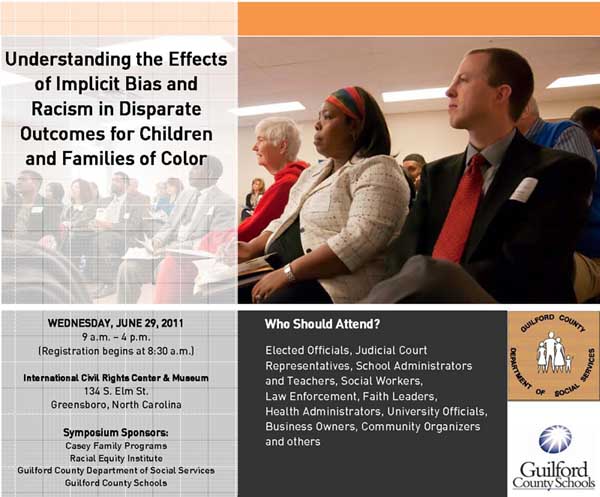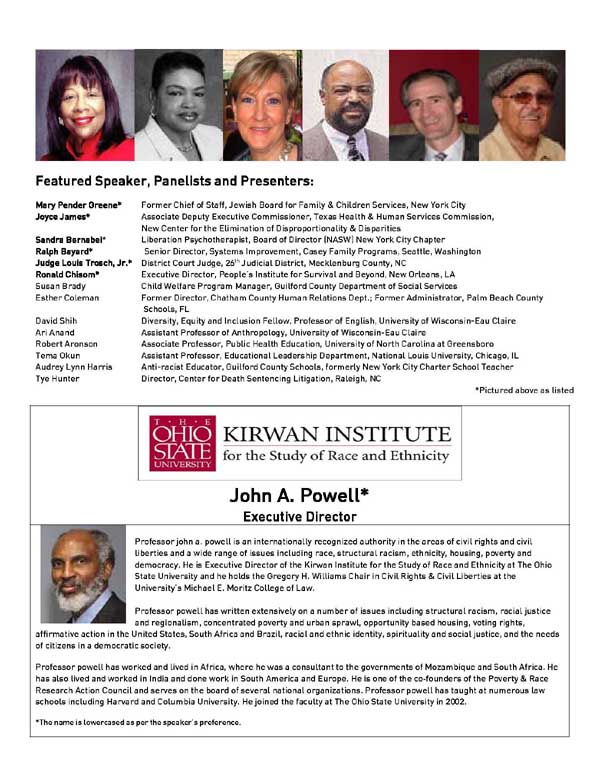|
June. 29, 2011 Symposium


Greensboro, NC discuss role of race in schools
http://rei.racialequityinstitute.org/wp-content/uploads/2011/06/Revised_Implicit_Bias_Flyer-5-31-111.pdf
see video at:
http://triad.news14.com/content/643120/greensboro-hosts-discussion-on-role-of-race-in-schools
http://www.wxii12.com/video/28399219/detail.html?taf=gws
Symposium held at the International Civil Rights Center and Museum
Racial disparity in Guilford County Schools and other systems across the country brought an open discussion Wednesday, June 29, 2011 to the International Civil Rights Center and Museum in downtown Greensboro.
http://triad.news14.com//Default.aspx?ArID=643120
Greensboro hosts discussion on role of race in schools
By:Caitlin Lockerbie
June 29, 2011
GREENSBORO " Racial disparity in Guilford County Schools and other systems across the country brought an open discussion Wednesday to the International Civil Rights Center and Museum in downtown Greensboro.
"People are here to try and better themselves as far as race relations, to understand racism when they see it and how to combat it," said Skip Alston, one of the museum's co-founders and chair of the Guilford County Commission.
School leaders and the Guilford County Department of Social Services partnered to bring national experts to the area to analyze how racial biases are affecting school experiences for children and their families.
"When we look at our institution, every institution in Guilford County has a racial disparity where African-American people are having the worst outcomes in those institutions," said Guilford County School Board 8th District representative Deena Hayes.
The discussions are looking to close the gap in school achievement while changing how the school system as a whole interacts with its students.
"There is something that we have internalized around race that is impacting the way we make decisions in classrooms, in waiting rooms, in offices," said Hayes.
"When there are large disparities in terms of outcomes with students, that should tell us to look more carefully at both what's happening at the unconscious level but also the structures that students are inhabiting," said Ohio State University professor John Powell.
Powell said only 2 percent of our emotional and cognitive processes are directly available to us consciously. The other 98 percent is unconscious and it affects our behavior, affect how we feel and we're not aware of it.
And because there's no switch to turn a person's bias off, Hayes says, "we're looking less at the students and more at the messages we're giving students, more at the way we're making decisions about how we're going to track students into gifted and talented areas, into the lower-performing areas and those kinds of things.
The museum says its looking to continue race-based discussions in the coming weeks. On July 27, the center is planning to host a leadership breakfast and symposium on cultural competency in the workplace.
---------------------------------------
For more information contact organizers:
Deena Hayes hayesd@gcsnc.com,
Monica Walker walkerm3@gcsnc.com
|

 Facebook
Facebook

 Facebook
Facebook